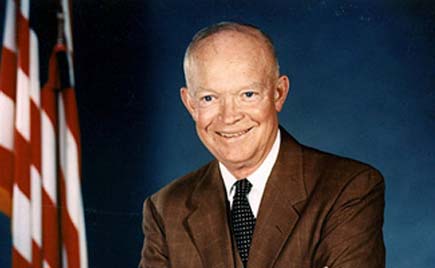Why the GOP should like Ike

Donald Trump and Carly Fiorina have succeeded so far by pressing hot-button issues. Both candidates have variously attacked the Iran nuclear deal, voiced hostility to immigrants, depicted Planned Parenthood as a baby-killing conspiracy, and declared the U.S. government a complete failure. “Our leaders are very, very stupid people,” Trump asserted.
Establishment candidates like Jeb Bush, Marco Rubio, and John Kasich have a choice to make. They can try to echo the anger and resentment of the insurgents. Or they can stand fast on bedrock conservative principles.
The pundits seem to think old-school Republicanism can’t mobilize the party anymore. But to win the White House in a national election, the GOP has to deliver a broader message than just hate and outrage.
The Republican playbook for winning back the presidency is easy to find. It was written by one of America’s most popular presidents. It produced two lopsided victories in national elections. When Republicans use this playbook, they win big. When they ignore it, they lose.
The author of this strategy? Not Nixon. Not Reagan. Not Bush 41 or Bush 43.
It was Ike.
Dwight D. Eisenhower was a political phenomenon. He won two landslide elections, garnering 55% of vote in 1952 and 57% in 1956. His job approval rating for his entire eight years in office averaged 65% -- far higher than Ronald Reagan or Bill Clinton. Americans in the 1950s did not just like Ike. They loved him.
Many writers chalk up Ike’s popularity to his war record, or his electric smile. Some say he got lucky, as the 1950s economy boomed on his watch. The world was relatively peaceful and Ike could find plenty of time for golf and fishing.
This perception of Ike is a myth that has blinded Republicans to Eisenhower’s achievements and his political skill. Here are five strategies Eisenhower used to win big national victories.
First, run as a conservative but remember to be compassionate. Eisenhower ran in 1952 as an avowed enemy of the New Deal. Twenty years of Democratic rule had led to a bloated state, big budget deficits, and what Ike called “socialism” or even the “dictatorship of the state.” He promised to shrink government and impose strict limits on spending. But Eisenhower and even the leading conservative of the day, Robert Taft, both agreed that the federal government did have a role to play in providing health insurance, social security, and housing for those in our society who desperately needed help. He did not paint the less fortunate as parasites, but as fellow citizens who could use a helping hand.
Second, remind citizens that paying taxes is a civic duty. Eisenhower had his priorities straight. He said he would shrink government and balance the budget first. Once that was done, Americans would earn a tax cut. But taxes, Ike said, were an obligation that we pay in return for the benefits of being an American citizen. The government had an obligation to use taxpayer money wisely, but it did need taxes in order to provide national security, health and education, infrastructure and basic services. Ike had no trouble acting like the adult in the room.
Third, speak well of our allies. Eisenhower knew that the United States could not have won World War II without allies, and he knew that in the Cold War contest with the Soviet Union, allies were vital. They help share the burden of defense spending and they also provide moral legitimacy in times of crisis. Eisenhower was deeply devoted to the NATO alliance, even though he never doubted which nation was its natural leader.
Fourth, use religious faith to unify the people rather than to divide them. Ike grew up in a devout household of Mennonites. He worshiped and read the Scripture every evening with his parents in the Eisenhower home in Abilene. But he was ecumenical in his beliefs. For Ike, God had made man to be free, and it was the purpose of democratic government to sustain that individual liberty. People of faith, whatever their denomination, could be joined together in a powerful community to advance freedom. No one faith had any privileged place above all the others.
Finally, don’t kill government; make it work better. Ike feared that government had become too big, wasteful, and arrogant. He wanted to make it leaner and more effective. But he did not wish to destroy it. Government could do great things: win wars, or advance science and technology, or build highways, schools and hospitals.
The wonderful thing about Ike is that he actually governed by these principles. In eight years, he shrunk the federal government; he cut defense spending; he balanced three budgets out of eight; he kept tax rates fairly high while overseeing a huge economic expansion; he solidified our alliances; he led a religious revival in America that favored no one denomination; and he made government work better, most notably through infrastructure projects.
Eisenhower showed that such principles have enormous appeal at the ballot box, drawing votes from every class, race, religion, ethnicity and gender.
Republicans, if you want to get back into the White House, it’s time to get your Ike on.
Will Hitchcock teaches history at University of Virginia and is director of Academic Programs at the Miller Center. He is now at work on a book called “The Age of Eisenhower: America and the World in the 1950s.”